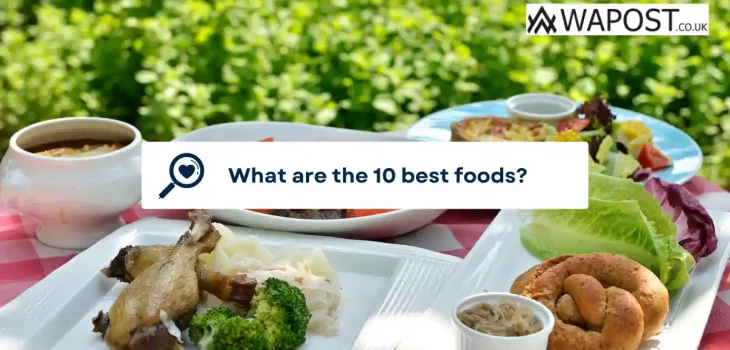What are the 10 best foods?
If you’re like me, your diet can be a source of anxiety. I’m always worried about what to eat and what not to eat. But the best thing is: there are no rules! You can eat whatever makes you feel good and stay healthy as long as it’s balanced with other nutrients and minerals (like iron or calcium). In this article, we will discuss what are the 10 best foods.
Fish
Fish is an excellent source of protein and omega-3 fatty acids, which can help you feel better when you’re feeling under the weather.
A serving of fish contains about 15 grams of selenium and 10 grams of B vitamins and plenty of other nutrients. It also has less fat than other animal sources like beef or chicken.
Eating fish regularly is best to choose varieties caught in sustainable ways (like wild-caught) so they aren’t overfished or endangered.
Nuts and Seeds
Nuts and seeds are rich in protein, unsaturated fats, vitamins, and minerals. They can be consumed as a part of a good diet or as snacks to curb cravings.
Nuts and seeds contain some calories, so you must eat them moderately to lose weight. However, they don’t have any sugar, so they won’t make you gain weight either!
A serving of nuts contains about 100 calories (20%), 2 grams of fat (4%), and 2 grams of carbs (3%).
Lentils and Beans
Lentils and beans are one of the best fiber, protein, and iron sources. This have twice as much fiber as potatoes per serving. They also contain more folate than other types of beans; however, they don’t contain as much calcium or vitamin C as other legumes.
Beans are high in protein at 35 grams per cup, almost half what you need daily (65 grams) for men and women over 18. This high-protein content makes it essential to choose low-fat or no-fat varieties to get all the benefits without worrying about how filling they will be!
Lastly: You should always look for canned versions rather than dried ones because they tend not to have preservatives added during processing; however, this doesn’t mean there aren’t any benefits associated with eating whole foods such as beans/lentils instead!
Natural Yogurt
- One food that can benefit your general health is yogurt. It contains probiotics and other beneficial bacteria, keeping your digestive system in good shape. Plus, it’s low in calories and high in protein—two important things for weight loss! Read our previous blog about Five Foods That Promote Weight Loss.
- Yogurt has been shown to lower blood pressure levels by as much as 10 points on average (or 14 if you’re over 60 years old). Suppose you have hypertension or preexisting high blood pressure issues such as heart disease or diabetes. In that case, dairy products may not suit you — talk with your doctor before adding yogurt to your daily diet plan.
- Yogurt also appears to reduce cholesterol levels by about 20%. So if there’s one thing we’ve learned from this article is that yogurt is worth adding to our diets!
Olive oil
Olive oil is a healthy fat and can be used for cooking and in salad dressings. It’s also high in monounsaturated fats, lowering the risk of heart disease-related LDL (“bad”) cholesterol levels.
Olive oil contains several antioxidants, including vitamin E and oleic acid, which have been shown to help prevent cancer and age-related skin disorders such as wrinkles or dryness.
Whole grains
Eating whole grains is a beautiful way to gain fiber, vitamins, and minerals.
Whole grains are rich in phytonutrients linked to a reduced risk of cancer and heart disease.
To incorporate more whole grains into your diet:
- Choose bread made with 100% whole wheat flour instead of white flour. You can also eat oatmeal as part of breakfast or lunch if you want something high in protein but low in carbs (and it adds lots of flavors).
- Add more beans like black beans or pinto beans to soups, salads or pasta dishes; they’ll add bulk without adding too much fat because they’re high in fiber! Beans are also high in protein, so if there’s not much meat left over from dinner, try adding some beans—they’re delicious!
Potatoes
Potassium, vitamin C, and vitamin B6 are found in large amounts in potatoes. They’re also a good fiber, iron, copper, and magnesium source.
Potatoes are a great food to eat if you’re looking for something filling but not too heavy on the stomach. They can be served almost any meal (soup or salad) and used in some recipes like mashed potatoes or French fries!
Greens
Greens are a great way to get your vegetables. Kale, spinach, collard greens, and Swiss chard are all great options for eating raw or cooked. You can even use them as wraps!
Ground up in a stir fry sauce like soy sauce and sesame oil; they will add flavor while also filling you up with nutrition. The best part is that these same veggies can also be used as toppings on salads!
Berries
Berries are a superfood. They’re high in antioxidants and help to improve brain function, reduce inflammation, prevent cancer and reduce the risk of heart disease and diabetes.
The best berries for your body include:
- blueberries (they’re loaded with vitamin C)
- strawberries (high in vitamin A)
Water
Water is good for your health, skin, and digestion. It can also help you lose weight and stay hydrated in the hot summer.
The benefits of drinking water are numerous: it helps prevent constipation, detoxifies the body, improves skin tone and elasticity, lowers blood pressure and cholesterol levels, reduces inflammation in joints (including those related to arthritis), boosts metabolism by increasing feelings of fullness after a meal—and much more!
A balanced diet is a key to optimizing your health.
A balanced diet includes all food groups:
- Fruits and vegetables
- Whole grains and beans or peas
- Lean meats (especially fish)
- Poultry and eggs
It also includes dairy products low in saturated fat; nuts and seeds that are high in fiber; oils such as olive oil or flaxseed oil; small amounts of red meat or processed meats only once per week at most; little sugar added to foods before cooking them (for example, honey on bread).
It’s important to know what you should be eating so that you can make good choices when eating out at restaurants or at home with family members who don’t follow a healthy lifestyle either because they don’t know better or because they aren’t interested in doing anything different than what they’ve been doing all along!
Conclusion
As you can see, plenty of delicious and healthy foods are out there. The key is to find the ones that work best for you.
Numerous experts, including the FDA and the Harvard School of Public Health, recommend eating foods for good health. It’s also essential to consider your overall diet, as one can’t simply look at individual foods in isolation.
The top 10 healthy foods are listed here to keep this in mind. Do you agree? Are there any particular foods you would include or omit from the list?








One Comment